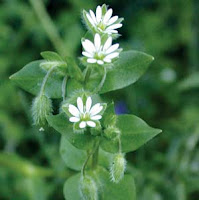 This is known far and wide as one of the easiest plants to forage for. Easily identifiable, easy to introduce into your commonly consumed wild-foods, and high in Vitamin C.
This is known far and wide as one of the easiest plants to forage for. Easily identifiable, easy to introduce into your commonly consumed wild-foods, and high in Vitamin C. Chickweed can be sprinkled in your soups, in your omelets, stews, or on your salad instead of that leaf of iceberg lettuce. You'll get far more vitamins and minerals from a sprig of chickweed! Enthusiasts claim that chickweed tastes much like a mild spinach. This simple, unassuming plant has levels of Ascorbic-acid, Beta-carotene, Calcium, Coumarins, Genistein, Gamma-linolenic-acid, Flavonoids, Hentriacontanol, Magnesium, Niacin, Oleic-acid, Potassium, Riboflavin, Rutin, Selenium, Triterpenoid saponins, Thiamin, and Zinc that multi-vitamins can only be envious of.
The plant that so many call a weed and try to kill can be used as an infusion to treat hoarseness and cough, a circulatory tonic, relieve constipation, and help to treat kidney complaints. New research shows the plant may be used as as an anti-histamine also! It can be used to treat rheumatic pain, ulcers and can be applied as a medicinal poultice. Chickweed has a bit of a reputation as an aid in weight loss. It's said to bring down swelling and perhaps even aid in settling upset stomachs. For anyone allergic to chickweed, reports are given that allergy symptoms do not appear when using the dried leaves.
It can be found nearly anywhere man does not want it; roadsides, your lawn or perhaps your neighbor's, abandoned parking lots and forgotten green spaces. Look for this green warrior on your next walk around your neighborhood and perhaps perk up your next sandwich or salad!
I've not tried chickweed yet, but it's on my list of urban edibles to try this summer!
No comments:
Post a Comment